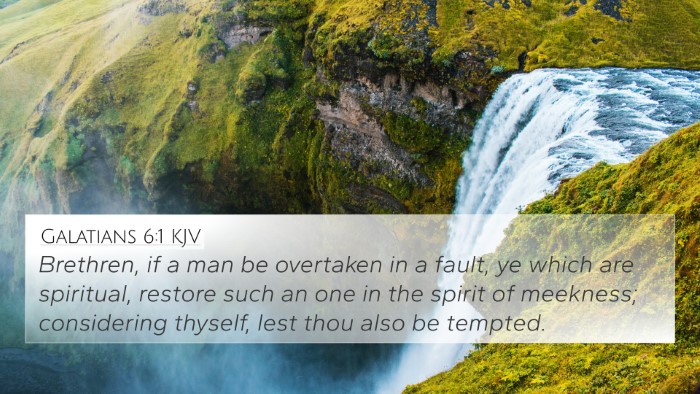Understanding Romans 15:1
Romans 15:1 (KJV): "We then that are strong ought to bear the infirmities of the weak, and not to please ourselves."
Romans 15:1 addresses the interpersonal relationships among believers, emphasizing the responsibility of those who are spiritually strong to support and uphold those who are weak. This verse serves as a bridge, connecting themes of strength, responsibility, and community within the body of Christ.
Meaning and Interpretation
The verse can be broken down and analyzed through various public domain commentaries:
-
Matthew Henry:
Henry emphasizes the moral obligation of the strong to aid the weak. He notes the focus on communal strength and vulnerability, reminding readers that Christians should prioritize the well-being of others rather than their own desires.
-
Albert Barnes:
Barnes highlights the context of this exhortation as a continuation of the previous chapter, where Paul talks about the liberty of believers. He interprets "the strong" as those with mature faith who should guide and support the weak, viewing this act as a mark of true Christian love.
-
Adam Clarke:
Clarke elaborates on the term "infirmities," interpreting it broadly to include doubts, fears, and weaknesses in faith. He reinforces the idea that the strong should not only guide the weak but also exhibit a spirit of humility and self-denial.
Thematic Connections and Cross-References
This verse has significant connections to several other scriptural passages, making it essential for a comprehensive understanding of the theme of community and mutual support among believers. Below are some cross-references:
- Galatians 6:2: "Bear ye one another's burdens, and so fulfill the law of Christ."
- 1 Thessalonians 5:14: "Now we exhort you, brethren, warn them that are unruly, comfort the feeble-minded, support the weak, be patient toward all men."
- Philippians 2:4: "Look not every man on his own things, but every man also on the things of others."
- 1 Corinthians 9:22: "To the weak became I as weak, that I might gain the weak: I am made all things to all men, that I might by all means save some."
- 2 Corinthians 1:24: "Not for that we have dominion over your faith, but are helpers of your joy: for by faith ye stand."
- Ephesians 4:2: "With all lowliness and meekness, with longsuffering, forbearing one another in love."
- Colossians 3:13: "Forbearing one another, and forgiving one another, if any man have a quarrel against any: even as Christ forgave you, so also do ye."
Applications and Reflections
The practical application of Romans 15:1 urges believers to recognize the diverse strengths and weaknesses present within the Christian community. Believers are to actively engage in supporting one another, fostering an atmosphere of mutual respect and growth. This call for selflessness can lead to a deeper, more unified body of Christ.
Conclusion
Romans 15:1 encapsulates the essence of Christian love and communal responsibility. Cross-referencing this verse with others aids in understanding how interconnected the teachings of the Bible are, revealing a framework where believers are called to live out their faith not only through personal piety but also through communal support.













